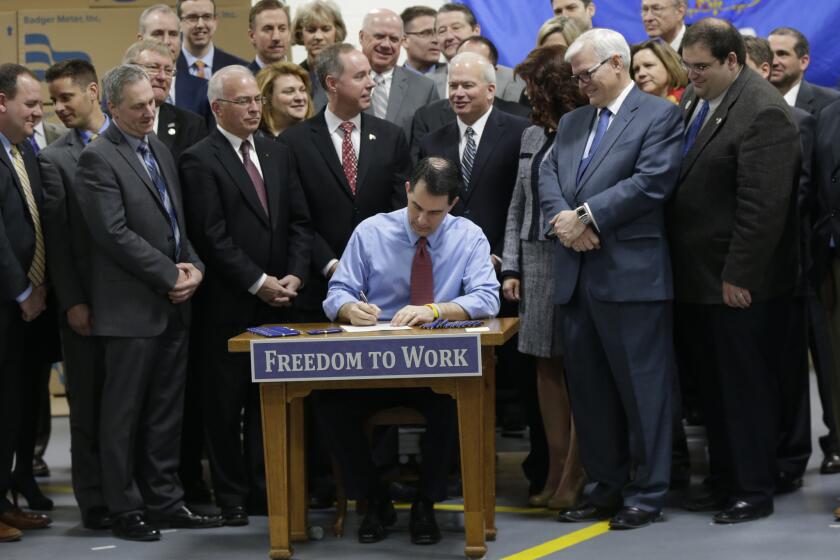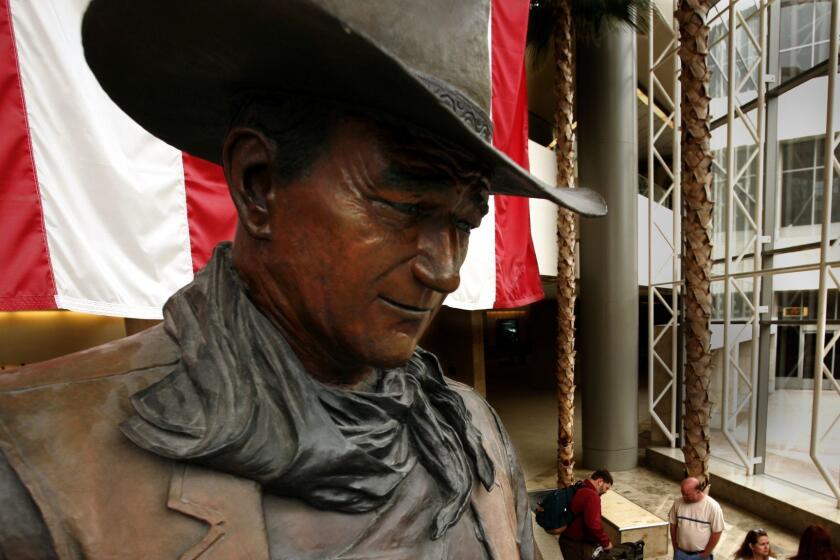Column: Yes, Elia Kazan named names, then made ‘On the Waterfront’ to justify his treachery
Actress Zoe Kazan created a stir at a television industry publicity event this week by candidly responding to a question about her grandfather, the distinguished director Elia Kazan, and his decision in testimony before the House Un-American Activities Committee to name eight others who had been Communist Party members with him.
Elia Kazan’s action in 1952 made him a pariah in some quarters of Hollywood, which was being riven by the McCarthy-era red-hunting. Numerous actors and writers saw their lives and livelihoods destroyed; those who refused to “name names” were blacklisted, denied work.
What makes Kazan an especially controversial figure was the action he took to defend his decision to inform: making “On the Waterfront.” It’s an indisputably great American film, but it has a dark, seldom-noticed theme.
I thought a lot about how the history of our country affected my family’s history, what it meant for my grandfather as an immigrant to this country to have his Americaness tested, and the choice that he made from that.
— Zoe Kazan speaks about her grandfather’s role in the 1950s Hollywood witch hunt
As Victor S. Navasky observed in his indispensable 1980 book “Naming Names” — one of the best explorations of the McCarthy witch hunt ever written — “On the Waterfront” was designed to make “the maximum case for informing.” Its screenwriter, Budd Schulberg, also had named names to HUAC, 15 of them.
Before delving more deeply into the Elia Kazan case, let’s recap Zoe Kazan’s appearance Wednesday at the Television Critics Assn. event. What may be most surprising about her remarks was that her grandfather’s history was still lively enough to be brought up by a member of the press, 68 years after the fact.
Or perhaps it’s not so surprising. As recently as 1999, protests greeted the Motion Picture Academy’s decision to award Elia Kazan an honorary Oscar. Many in the audience at the Oscars ceremony refused to stand and applaud when the then-89 year old director took the stage to accept his award. Kazan died in 2003.
As my colleague Meredith Blake reports, Zoe Kazan was appearing on a panel promoting her latest project, a TV adaptation of the Philip Roth novel “The Plot Against America,” when she was asked about her grandfather.
The term “socialism” has been enjoying something of a vogue lately, typically used to describe policies that were part of American mainstream politics as recently as the 1980s.
The journalist first apologized for bringing up “hard times for you.” Kazan replied, “You’re not bringing up hard times for me. You’re bringing up hard times for our country.”
She continued, “I have not wanted to weigh in on my family’s political history, partially because of the other people it involved in my family who have prized their privacy over a public life, so I’m not going to go into it, but I will say that I thought a lot about how the history of our country affected my family’s history, what it meant for my grandfather as an immigrant to this country to have his Americaness tested, and the choice that he made from that.”
Referring to “The Plot Against America,” based on Roth’s alternative history in which the right-winger and Nazi sympathizer Charles Lindbergh is elected president, she concluded: “Those were the things that were on my mind as I worked on this. It was a profound experience for me working on this — personally, politically, artistically. And I thought a lot about my own choices that I’ve made — the way that I choose to live my life.”
The 1950s witch hunt was indeed a dark period in American politics and culture. Writers and artists have struggled to come to terms with it ever since. Roth’s 1998 novel “I Married a Communist” is one example. Most recently, the biopic “Trumbo” explored the life of screenwriter Dalton Trumbo, who unrepentantly refused to name names and was blacklisted for more than a decade, during which he won two Oscars under a pseudonym.
My personal favorite is the 1976 movie “The Front,” in which Woody Allen, in a dramatic role, plays a nebbishy nobody enlisted to pose as a television writer so a clutch of blacklisted writers can get their screenplays produced. (There’s an entertaining scene in which Allen, stopping at a bookstore to acquire some literary cred to impress his love interest, a TV producer, orders as if at a deli counter: “All right, give me two Hemingways and a Faulkner.”)
Wall Street Democrats’ fear of Elizabeth Warren reminds us that they opposed the New Deal too.
The film’s end credits identify its creators and actors mischievously and triumphantly by the year they were blacklisted — director Martin Ritt (1951), screenwriter Walter Bernstein (1950), and actors Zero Mostel (1950), Herschel Bernardi (1953), Lloyd Gough (1952) and Joshua Shelley (1952). But I digress.
The goal of the House Un-American Activities Committee was less to ferret out Communist Party influence in Hollywood than to subject its targets to ritual public degradation. In this ritual, those called before the committee were expected to confess to having been naively misled by the insidious communists into tailoring their works to conform to communist doctrine — preferably by subterfuge, so the innocent American public wouldn’t know it was being subverted from within.
They were prompted to name others with whom they had joined ostensibly communist front organizations or who they knew to be sympathizers. In virtually every case, these names were not secret, since anti-communist organizations had started identifying purported communists in 1950.
Summoned before the committee, dozens capitulated. Some did so in the sincere belief that they were exposing subversives, some to preserve their careers against threatened blacklisting, some to settle scores, some out of a combination of all these motivations.
Some went to their graves confident in their self-assessments as patriots; some spent years trying to make amends with those they exposed or in therapy to come to terms with their own actions; some lost themselves in alcohol or depression. The informers included some of the leading figures in Hollywood and the entertainment industry, including actors Lee J. Cobb and Sterling Hayden.
The most anti-union law in the U.S. is the 1947 Taft-Hartley Act. It should be repealed.
The resisters also included some of the most prominent members of the Hollywood establishment, among them Trumbo and other writers whose screenplays had been among the most successful and honored works of their time.
The roster of blacklisted figures is long and shocking. Among the 150 figures identified as “red sympathizers” in a notorious pamphlet called “Red Channels” and subsequently barred from Hollywood work were actors Jose Ferrer, John Garfield, Judy Holliday and Edward G. Robinson.
Others added to the blacklist later included Eddie Albert, Orson Bean, and Ossie Davis and Ruby Dee. Some, such as Robinson, attempted to get back into Hollywood’s good graces by what Navasky calls “self-abnegation” before HUAC, although that did not always require informing on others.
Elia Kazan was called before the committee on two occasions in 1952. At the time he was already a star director of Broadway and Hollywood. As Navasky reports, “from 1946 on he had de facto first-refusal rights on any Broadway-bound play.” He had directed Arthur Miller’s “Death of a Salesman” on stage in 1949, and in 1951 he had capped his film career by directing “A Streetcar Named Desire.”
Many in the entertainment industry hoped that Kazan’s summoning by the committee would help destroy the blacklist. Social issues had been at the forefront of much of his work. Moreover, he was such a powerful and prominent figure that he might have been able to resist the committee’s demands without fear for his career.
But it was not to be so. In this first appearance in January, he acknowledged that he had been a member of the Communist Party from 1934 to 1936, but refused to name names. In April he returned, this time with a foursquare condemnation of what he called the party’s “police-state” attempts to control his work and named eight fellow members. They included the playwright Clifford Odets and actors Morris Carnovsky and his wife Phoebe Brand. (The Times published all eight names the next day.)
Most people familiar with the life story of John Wayne are aware that the late movie star was a dyed-in-the-wool right-winger — after all, he was still making a movie glorifying America’s conduct of the Vietnam War (“The Green Berets,” 1968) well after the country had begun to get sick of the conflict.
Kazan remained always an unrepentant informer. Two days after testifying, he took out a full-page ad in the New York Times explaining his decision and calling on others to follow his example. He wrote that he had testified to protect his adopted country (he was born in what was then Constantinople to Greek parents) “from a dangerous and alien conspiracy” so the U.S. could “still keep the free, open, healthy way of life that gives us self-respect. ... I believe that the American people can solve this problem wisely only if they have the facts about communism. All the facts.”
“On the Waterfront” was Kazan’s ultimate effort to justify his informing. As Navasky describes the film, it “makes the definitive case for the HUAC informer or at least is ... a valiant attempt to complicate the public perception of the issue.”
Plainly, Kazan and Schulberg place their thumbs on the scale in favor of informing. The target of the “snitch” Terry Malloy played by Marlon Brando is the thuggish and corrupt union boss Johnny Friendly, played by Lee J. Cobb, not the well-meaning left-leaning writers and performers who were the victims of the blacklist in real life. In the film, Terry’s decision to expose Friendly comes after the boss has murdered his brother Charlie, played by Rod Steiger.
“Kazan-Schulberg leave no room for ambiguity in ‘Waterfront,’” Navasky writes. The killing of Charlie “denies the audience any opportunity for genuine consideration of the ambivalent and dangerous complexities of the informer issue. ‘Squealing’ may be relative, but in ‘Waterfront’ it is mandatory.”
The 1999 Oscar ceremony underscored the ambiguity of the motivations and actions in the Hollywood crisis of the 1950s. As is evident from the exchange between a TV reporter and Zoe Kazan, the issue has never faded away. That’s probably a good thing, given the pressures on moral judgment faced in the entertainment industry, as in so many other walks of life.
Kazan paid no detectable professional price for naming names. He directed 11 films after testifying, wrote two best-selling novels and was lauded as a seminal influence by actors and directors, among them Martin Scorsese.
On a personal level, the record is more equivocal. Navasky repeats an unverified story that in 1955, Arthur Miller, whose success as a playwright had owed so much to Kazan’s directing, sent him a copy of his play “A View From the Bridge,” which dealt critically with informing.
“I would be honored to direct it,” Kazan wrote Miller.
“You don’t understand,” Miller wrote back. “I didn’t send it to you because I wanted you to direct it. I sent it to you because I wanted you to know what I think of stool pigeons.”
More to Read
Inside the business of entertainment
The Wide Shot brings you news, analysis and insights on everything from streaming wars to production — and what it all means for the future.
You may occasionally receive promotional content from the Los Angeles Times.













